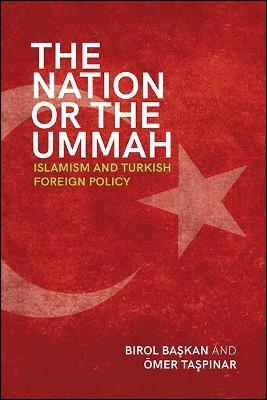
The Nation or the Ummah
Islamism and Turkish Foreign Policy
Seiten
2022
State University of New York Press (Verlag)
978-1-4384-8648-2 (ISBN)
State University of New York Press (Verlag)
978-1-4384-8648-2 (ISBN)
Explains why Turkey embraced the Arab Spring despite the risk both domestically and internationally.
Turkey's enthusiastic embrace of the Arab Spring set in motion a dynamic that fundamentally altered its relations with the United States, Russia, Qatar, Egypt, Saudi Arabia, the United Arab Emirates, and Iran, and transformed Turkey from a soft power to a hard power in the tangled geopolitics of the Middle East. Birol Başkan and Ömer Taşpınar argue that the ruling Justice and Development Party's (AKP) Islamist background played a significant role in the country's decision to embrace the uprisings and the subsequent foreign policy direction the country has pursued. They demonstrate that religious ideology is endogenous to—shaping and in turn being shaped by—Turkey's various engagements in the Middle East. The Nation or the Ummah emphasizes that while Islamist religious ideology does not provide specific policy prescriptions, it does shape the way the ruling elite sees and interprets the context and the structural boundaries they operate within.
Turkey's enthusiastic embrace of the Arab Spring set in motion a dynamic that fundamentally altered its relations with the United States, Russia, Qatar, Egypt, Saudi Arabia, the United Arab Emirates, and Iran, and transformed Turkey from a soft power to a hard power in the tangled geopolitics of the Middle East. Birol Başkan and Ömer Taşpınar argue that the ruling Justice and Development Party's (AKP) Islamist background played a significant role in the country's decision to embrace the uprisings and the subsequent foreign policy direction the country has pursued. They demonstrate that religious ideology is endogenous to—shaping and in turn being shaped by—Turkey's various engagements in the Middle East. The Nation or the Ummah emphasizes that while Islamist religious ideology does not provide specific policy prescriptions, it does shape the way the ruling elite sees and interprets the context and the structural boundaries they operate within.
Birol Başkan is non-resident scholar at the Middle East Institute. He is the author of several books, including Turkey and Qatar in the Tangled Geopolitics of the Middle East and From Religious Empires to Secular States: State Secularization in Turkey, Iran, and Russia. Ömer Taşpınar is Professor of National Security Strategy at the National War College and Senior Fellow at the Brookings Institution. He is the author of several books, including What the West is Getting Wrong about the Middle East: Why Islam is Not the Problem.
Acknowledgments
Introduction
1. Turkey's Traditional Kemalist Foreign Policy
2. JDP's First Decade
3. The Arab Spring
4. Islamism at Work
Conclusion: Reflections on the so-called Turkish Model
Notes
Bibliography
Index
| Erscheinungsdatum | 18.03.2022 |
|---|---|
| Zusatzinfo | Total Illustrations: 0 |
| Verlagsort | Albany, NY |
| Sprache | englisch |
| Maße | 152 x 229 mm |
| Gewicht | 227 g |
| Themenwelt | Sozialwissenschaften ► Politik / Verwaltung ► Europäische / Internationale Politik |
| Sozialwissenschaften ► Politik / Verwaltung ► Politische Systeme | |
| Sozialwissenschaften ► Politik / Verwaltung ► Staat / Verwaltung | |
| ISBN-10 | 1-4384-8648-0 / 1438486480 |
| ISBN-13 | 978-1-4384-8648-2 / 9781438486482 |
| Zustand | Neuware |
| Haben Sie eine Frage zum Produkt? |
Mehr entdecken
aus dem Bereich
aus dem Bereich
Studienbuch
Buch | Hardcover (2023)
De Gruyter Oldenbourg (Verlag)
44,95 €
erfolgreiche Interessenvertretung durch Prozesskompetenz im komplexen …
Buch | Hardcover (2023)
Wiley-VCH (Verlag)
42,00 €


